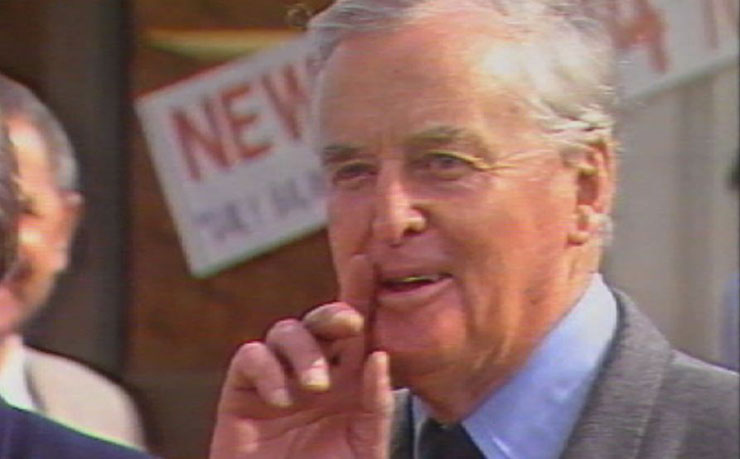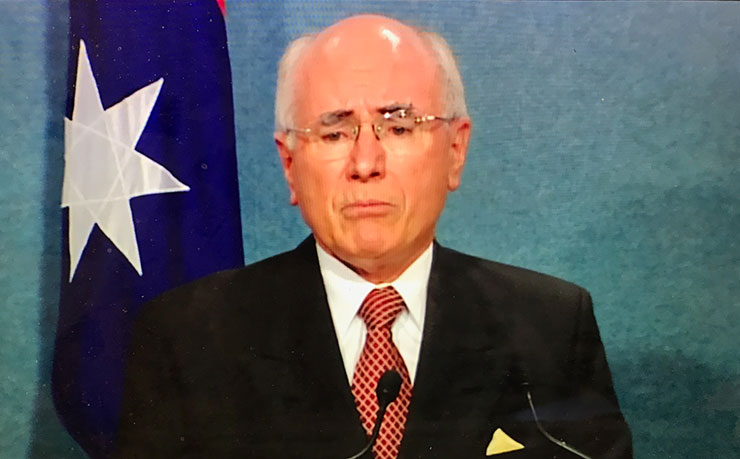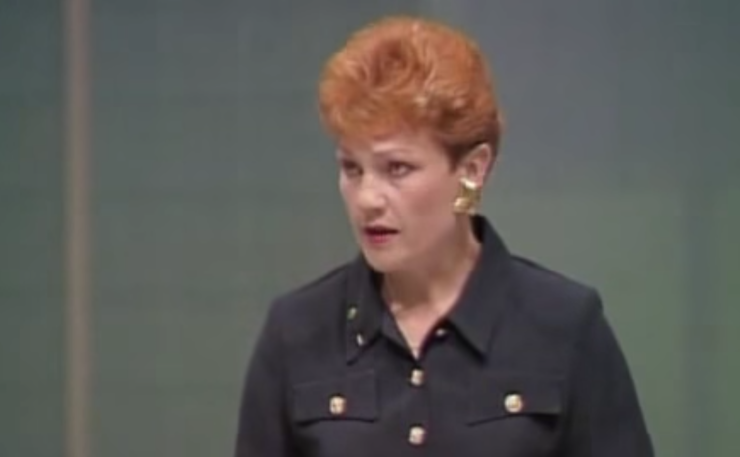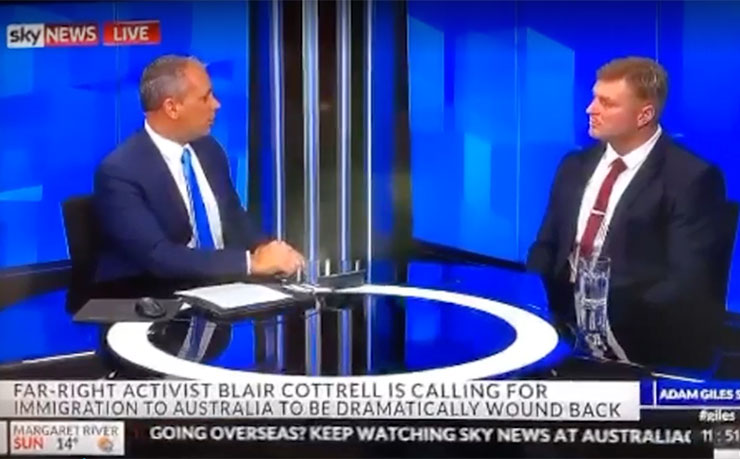Progressives need to mobilise to combat the rise of the far right in Australia, writes Ben Eltham. The time for complacency is over.
Australia is a nation-state founded on white nationalism. The white supremacist roots of Australia are undeniable. In 1901, Australia’s brand new parliament passed the notorious Immigration Restriction Act in its first sitting, inaugurating the legal basis for the White Australia policy.
The White Australia policy was formally abolished in 1973, and the Whitlam government went further by enshrining racial equality in law with the Racial Discrimination Act of 1975. The Fraser government also notably freed up migration settings, showing genuine leadership in settling south-east Asisan migrants in the late 1970s. For many, this was the beginning of a more pluralistic and liberal nation, embracing a multi-hued democracy of genuine tolerance and diversity.
Both major parties have since celebrated their role in the creation of a modern multicultural Australia. At least, so the story goes.
But the progressive view of Australian politics can’t paper over the fact that racism remains a potent force in our democracy. Despite genuine progress and reform in the 1970s and 80s under Whitlam, Fraser and Hawke, a residual strain of white nativist politics has always lingered, never quite extinguished.
Looking at Australian politics this past few weeks, the question needs to be asked: how far have we come?
Not very, if last week’s first speech by Katter Australia Senator, Fraser Anning is anything to go by. Anning’s speech made worldwide news because of his calculated use of the phrase “final solution” to describe his plan for a plebiscite on Australian immigration policy.
Both Labor and Liberal rushed to condemn Anning, and his views received widespread condemnation in the media. But few have bothered to listen through to Anning’s speech, or read it in full. That’s a shame, because a close reading provides us with many clues to the development of right-wing thinking in this country.
In many ways Anning’s inaugural speech is quite a traditional address. He begins by tracing his personal history, firmly anchored in the pastoralist north of Queensland, “born to a cattle-grazing family in far north-west Queensland,” his family “having settled in the Charters Towers area in the 1860s before there was a Charters Towers”.

“Like most blokes from the bush 40 years ago, I was a committed National Party supporter. I was always a Joh (Bjelke-Petersen) man and, to this day, I regard the Joh era as Queensland’s golden age. It was only the fact that the National Party abandoned Joh’s legacy and moved to the left 25 years ago that led me to switch to One Nation.”
Anning is a white, working class Christian from regional Australia, and he can’t really understand what happened to the world he grew up in.
Fifty years ago Australia was a cohesive, predominantly Anglo-Celtic nation […] Until the late 1960s, prior to the rise of Whitlam in the Labor Party, there was a broad consensus between the Liberal and Labor parties on the kind of society we were and what we should be in the future. In the 1960s, both Liberal and Labor parties reflected a common framework of Judeo-Christian values, supporting the family as the basic unit of society. They both supported the principle that marriage was a union between a man and woman, and both parties recognised the sanctity of the lives of the unborn. Both major parties agreed that people should be free to live their own lives and say what they thought without fear of state sanction. Both sides of politics recognised the importance of our manufacturing industries as well as our farming and mining. Both parties recognised the importance of our predominantly European identity.
What happened? Whitlam, of course, driven by the spectre of cultural Marxism. Like so many contemporary conservatives, Anning is particularly exercised by the ideas of Antonio Gramsci, the Italian Marxist imprisoned by Mussolini. “Gramsci’s insight,” Anning writes, “was to see revolution in cultural rather than economic terms, with ‘cultural hegemony’ as the key to supposed class dominance. The Marxist state, Gramsci argued, could be achieved by gradual cultural revolution — subverting society via a long march through the institutions.”
As a summary of Gramsci’s thought, this is barely better than a Wikipedia entry. But as a potent signpost to the far-right, it’s telling. It’s noteworthy that Anning gave his speech on the 14th of August, 2018, playing into potent ‘1488’ neo-Nazi numerology. This is the injection of white supremacist ideology into the heart of Australian democracy.
Most of us who have covered Australian politics for any length of time will be accustomed to the way that racial politics seems to lie dormant for long periods, only to rear its ugly head with renewed virulence whenever summoned by a sufficiently ruthless politician or media columnist. In the Howard years, for instance, we became accustomed to the carefully calibrated dog whistling of the immigration debate, in which an overt insistence on a multi-ethnic Australia was counter-balanced by chest thumping rhetoric about who we would allow to come to our country, and the circumstances in which they would come.

That’s all changed in 2018. Something about Australian politics this year has seemed qualitatively different. Both our parliamentary politics and our public sphere have been charged with an overt racism, expressed in ways that would seem shocking to those who remember a gentler and more circumspect national debate.
The coded language and dog whistling hasn’t vanished, but it has increasingly been accompanied by sentiments and statements that are far more straightforward in their racial tone. Since the beginning of the year, we’ve seen Home Affairs Minister Peter Dutton repeatedly demonise ‘African gangs’ and suggest Melburnians are afraid to go out at night because of the threat of immigrant crime – a suggestion supported by the Prime Minister. We’ve seen Multicultural Affairs Minister Alan Tudge talk openly about migrant enclaves that refuse to integrate, warning about threats to Australia’s social cohesion from those who don’t speak English. We’ve seen the former prime minister Tony Abbott, still a figure of real if declining influence within his party, explicitly call for an end to non-discriminatory immigration, and effectively call for the resumption of a race-based migration policy. And, of course, we’ve seen racist ideas and genuine white supremacists championed in the mainstream media, including the presence of a Canadian white supremacist and an Australian neo-Nazi on the national commercial cable news channel, Sky News.
This is new, as astute observers with long experience, from Robert Manne to Paul Syvret and Tim Dunlop, have noted. In the late 1980s, when John Howard cautiously moved to re-open racialised debates about immigration, the reaction against him was strong and immediate, and indeed contributed to Howard’s loss of the opposition leadership. In 1996, when a little-known Liberal candidate by the name of Pauline Hanson was discovered to have made overtly racist remarks about Indigenous Australians, she was quickly disendorsed by the Liberal Party, and attacked by Liberal politicians as someone not fit to hold office. The Liberal Party preferenced against One Nation for much of the Howard years in most states and territories; throughout the 2000s, the Liberal party continued to insist that it was committed to multiculturalism and colour-blind immigration.
That post-Whitlam consensus against racism and in favour of multiculturalism is now breaking down. It is without doubt that many members of the Liberal Party – including the Home Affairs Minister himself, reported this morning to be preparing to challenge for the Prime Ministership – oppose migration in and of itself. Many also explicitly oppose Muslim immigration.We’re now seeing the emergence of Liberal politicians and fellow travellers in the media who are openly calling for an end to non-white migration.
To say this is a dangerous moment in modern Australian democracy is an understatement.
Those following the increasingly rapid slide of the Australian right towards illiberalism, tribalism and crudity will not be surprised by recent developments. Clear-eyed observers like the Guardian’s Jason Wilson have been chronicling the spread of formerly fringe and discredited ideas from the edges of far-right discourse into the conservative mainstream for some time.
The crucible of climate change and the ascension of Donald Trump to the US presidency have proved powerful motive enablers, acting as gateway drugs for formerly moderate conservatives looking to dip their toes into the murky waters of more red-blooded right-wing politics. So too has the rise of dominant cultural movements such as gay and lesbian equality, feminism and environmentalism. As Corey Robin points out in his fine study of modern conservatism, The Reactionary Mind, conservative thought is far more supple and flexible than it is often given credit for by its left wing opponents.

The progression of climate denialism to the central plank of the Liberal Party’s energy policy gives us a template for what is happening with immigration policy and race. Just as with climate change, the ability of ideas to move from the fringes of far-right hate groups into the mainstream of conservative politics is proving to be an important mode of transmission for the radicalisation of the Australian right.
Once again, the agenda is being driven by the vocal commentators on the party’s right, many of whom have been flirting with tropes of white supremacy for years. The fact that an acknowledged neo-Nazi could make his way onto prime time on Sky News is no accident; nor is it a coincidence that Andrew Bolt has repeatedly played host to such alt-right luminaries as Lauren Southern and Milo Yiannopoulos.
Progressives could learn a thing or two from the current ascendency of the alt-right in the national debate. The right has proved itself adept at marching through the conservative institutions, to the degree that even though the Turnbull moderates are supposedly in charge of the national party room, movement conservatives have made significant in-roads into the Liberal Party machinery in a number of key states. In Victoria, they have seized control. It is this factional power, allied to the megaphones of Sky News and the Murdoch tabloids, that has provided a conduit for white supremacy to move into the corridors of power.
To combat this threat, Australians who believe in a progressive and multicultural society will need to shed their complacency. The far-right is resurgent in Australia, and the events of recent months should leave no-one under any illusions as to their organisation or determination.
Those of us who oppose racism and prejudice will have to redouble our efforts in organising and campaigning. Direct action will prove far more effective than satisfying but empty displays of anguish on social media.

The advertising boycott of Sky currently being undertaken by Sleeping Giants Australia should be just the beginning. The left in Australia needs to raise the stakes. The purveyors of hatred and division need to be actively resisted on all fronts: social, political, economic and cultural.
One way to do this is to raise the social and reputational cost of hate speech. Major protest action against the power centres of far-right agitation should be planned and organised. Sky News for instance, is a relatively small organisation, with a limited number of key studios in Sydney, Canberra and Melbourne; concerted non-violent direct action could easily see it taken off line. The Institute of Public Affairs, with one physical office in Melbourne, is arguably even more vulnerable.
More importantly, major grass-roots campaigning needs to be undertaken to expose links between the far-right and Liberal and National Party MPs, and to make them politically toxic. This is already underway in Peter Dutton’s seat in Brisbane, but it could be extended to other vulnerable far-right MPs, such as Craig Laundy, Craig Kelly, Andrew Hastie and Alan Tudge.
If progressives are nervous about the implications of such tactics, they need only ask themselves what their opponents are now doing. As the marriage plebiscite demonstrated, there is a large latent support base for tolerance and multiculturalism in contemporary Australia. But it needs to be mobilised. The time for complacency is over.
Donate To New Matilda
New Matilda is a small, independent media outlet. We survive through reader contributions, and never losing a lawsuit. If you got something from this article, giving something back helps us to continue speaking truth to power. Every little bit counts.




